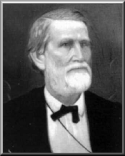
The 1848 United States presidential election was the 16th quadrennial presidential election, held on Tuesday, November 7, 1848. In the aftermath of the Mexican–American War, General Zachary Taylor of the Whig Party defeated Senator Lewis Cass of the Democratic Party.

The 1852 United States presidential election was the 17th quadrennial presidential election, held on Tuesday, November 2, 1852. Democrat Franklin Pierce defeated Whig nominee General Winfield Scott. A third party candidate from the Free Soil party, John P. Hale, also ran and came in third place, but got no electoral votes.
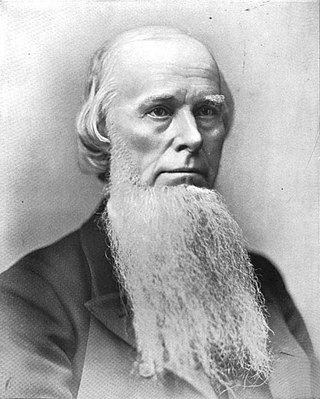
Joseph Emerson Brown, often referred to as Joe Brown, was an American attorney and politician, serving as the 42nd Governor of Georgia from 1857 to 1865, the only governor to serve four terms. He also served as a United States Senator from that state from 1880 to 1891.

The 1962 California gubernatorial election was held on November 6, 1962. The Democratic incumbent, Pat Brown, ran for re-election against former U.S. vice president and 1960 Republican presidential nominee Richard Nixon. In his concession speech the following morning, Nixon accused the media of favoring his opponent Brown, stating that it was his "last press conference" and "You won't have Nixon to kick around any more." Six years later, Nixon was elected President of the United States, and exactly ten years after this press conference he was re-elected in a landslide.
James Lynwood Bentley, Jr., was from 1963 to 1971 the comptroller general of Georgia. Originally a Democrat, Bentley and four other constitutional officers in Georgia switched to the Republican Party in 1968 to protest the violence that shook the Democratic National Convention in Chicago, Illinois that year.
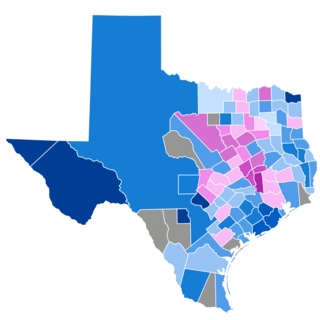
The 1855 Texas gubernatorial election was held on August 6, 1855 to elect the governor of Texas. Incumbent Governor Elisha M. Pease was reelected to a second term, winning 57% of the vote.

The 1966 Georgia gubernatorial election was held on November 8, 1966. After an election that exposed divisions within the Georgia Democratic Party, segregationist Democrat Lester Maddox was elected Governor of Georgia. The voting also brought future President Jimmy Carter to statewide prominence for the first time. The election was the closest in Georgia gubernational history; Republican candidate Bo Callaway won a plurality of the popular vote, but lost the contingent election in the Georgia General Assembly to Maddox. It was also the first time since 1916 that the Republican Party contested a gubernatorial election.

Elections in Alabama are authorized under the Alabama State Constitution, which establishes elections for the state level officers, cabinet, and legislature, and the election of county-level officers, including members of school boards.

The 1859 New Jersey gubernatorial election was held on November 8, 1859. Opposition Party nominee Charles Smith Olden defeated Democratic nominee Edwin R. V. Wright with 50.76% of the vote.

The 1859 California gubernatorial election was held on September 7, 1859 to elect the governor of California.
The 1876 Massachusetts gubernatorial election was held on November 7. Incumbent Republican Governor Alexander H. Rice was re-elected to a second term in office over former Minister to Great Britain Charles F. Adams.

The 1928 United States presidential election in Georgia took place on November 6, 1928, as part of the wider United States presidential election. Voters chose 14 representatives, or electors, to the Electoral College, who voted for president and vice president.
The 1854 Massachusetts gubernatorial election was held on November 15. American Party candidate Henry J. Gardner was elected to his first term as governor, defeating incumbent Whig Governor Emory Washburn.
The 1853–54 Massachusetts gubernatorial election consisted of an initial popular held on November 14, 1853, which was followed by a legislative vote that was conducted on January 9, 1854, which elected Whig Party nominee Emory Washburn. The ultimate task of electing the governor had been placed before the Massachusetts General Court because no candidate received the majority of the vote required for a candidate to be elected through the popular election.
The 1850–51 Massachusetts gubernatorial election consisted of an initial popular held on November 11, 1850 that was followed by a legislative vote that was conducted on January 11, 1851. It saw the election of Democratic Party nominee Emory Washburn. The ultimate task of electing the governor had been placed before the Massachusetts General Court because no candidate received the majority of the vote required for a candidate to be elected through the popular election.
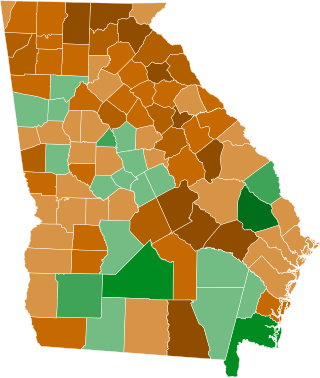
The 1851 Georgia gubernatorial election was held on October 6, 1851, to elect the governor of Georgia. Howell Cobb, nominee for the newly formed Constitutional Union Party, defeated the Southern Rights Candidate, Charles McDonald.
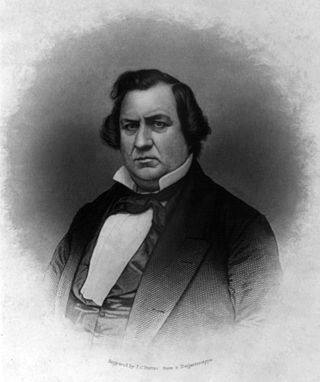
The 1855 Georgia gubernatorial election was held on 1 October 1855 in order to elect the Governor of Georgia. Democratic nominee and incumbent Governor Herschel V. Johnson was re-elected against Know Nothing (Sam) nominee Garnett Andrews and Temperance nominee B. H. Overby.

The 1861 Georgia gubernatorial election was held on October 2, 1861, in order to elect the Governor of Georgia. It was the first gubernatorial election in Georgia under the Confederate States of America and saw Democratic nominee and incumbent Governor Joseph E. Brown win a third term against Anti-Brown Democratic nominee Judge E. A. Nisbet.

The 1857 Georgia gubernatorial election was held on October 5, 1857, in order to elect the Governor of Georgia. Democratic nominee and state circuit court judge Joseph E. Brown defeated Know Nothing (Sam) nominee and State legislator Benjamin Harvey Hill.

The 1863 Georgia gubernatorial election was held on October 5, 1863, in order to elect the Governor of Georgia. It was the last gubernatorial election in Georgia under the Confederate States of America and saw Independent Democrat nominee and incumbent Governor Joseph E. Brown win a fourth and final term against Unionist nominee Joshua Hill and Pro-Administration nominee Lt. Col Timothy Furlow.



